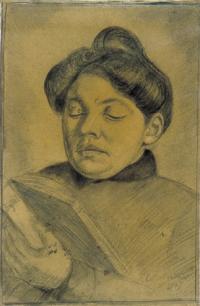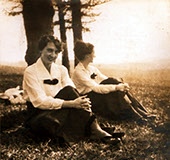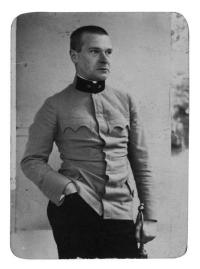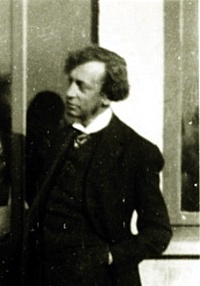Fleurs du Mal Magazine


Or see the index

De
verlaten
loopgraaf
Een wond
in d’ aard!
Een geul!
Een spleet!
Deed dat
de mensch,
die denkt,
die weet?
Arm, voet,
been, hoofd,
‘t ligt al
dooreen.
Men zoekt
een mensch!
Er is
er geen!
Slechts bloed!
slechts stank!
Slechts lijk!
Slechts dood!
Op, op!
Meer moord.
Uw land
blijv’ groot!
Agnita Feis
(1881 – 1944)
Uit: Oorlog. Verzen in Staccato (1916).
De verlaten loopgraaf
• fleursdumal.nl magazine
More in: *War Poetry Archive, Agnita Feis, Archive E-F, Doesburg, Theo van, Essays about Van Doesburg, Kok, Mondriaan, Schwitters, Milius & Van Moorsel, Feis, Agnita, Kok, Antony, WAR & PEACE
A Little Novel
(in four little chapters)
CHAP. I
A little nook in garden shady;
A little squeeze of finger-tips ;
A little question to a lady;
A little “Yes** from rosy lips.
CHAP. II
A little flirting with another;
A little shadow on a blind;
A little tiff, a little bother:
A little bit of Beauty’s mind.
CHAP. III
A little coolness in the greeting;
A little rift within the lute;
A little hour of wild entreating;
A little lady, proudly mute.
CHAP. IV
A little note of sad upbraiding ;
A little poison in a glass;
A little willow-tree o’ershading
A little tomb-stone in the grass.
Montague Horatio Mostyn Turtle Pigott
(1865–1927)
Melody versus Malady (Poem)
• fleursdumal.nl magazine
More in: Archive O-P, Archive O-P, Mostyn Turtle Pigott

Protestgedicht, 1968
(gevonden in een oud schoolboek van een soixante-huitard)
Ga weg, op uw plaats wil ik zitten.
Va-t’en, gij daar in uw driedelig grijs.
De tijd is rijp voor nieuwe winden.
Wij willen grote auto’s, en een parking
voor onszelf. Want ruimte moet er zijn.
Recht hebben wij daarop, besef dat wel.
Het volk moet alles weten, iedereen toch
evenveel ongeveer. Af willen wij van geloven
in de Werkelijke Tegenwoordigheid, af!
En negers mogen dromen wat ze willen,
maar negers mogen zij niet meer heten.
Ouden-van-dagen bestaan niet meer
en vrouwen moeten kinderen wíllen.
Herenigen zullen wij hier families die
uit hun bergdorpen oma’s willen en net
zo ongeletterde bruiden. Opvoeden zullen
wij het volk vanachter megafoons en vanaf
uitklaphoezen, beschijnen met nieuw licht.
Ga weg, maak onze plaats snel vrij nu.
Wij pardonneren u uw desertie.
Wij vergeven jou jouw deesertsie.
Bert Bevers
Ongepubliceerd
Bert Bevers is a poet and writer who lives and works in Antwerp (Be)
• fleursdumal.nl magazine
More in: Archive A-B, Archive A-B, Bevers, Bert

Folded Power
Sorrow can wait,
For there is magic in the calm estate
Of grief; lo, where the dust complies
Wisdom lies.
Sorrow can rest,
Indifferent, with her head upon her breast;
Idle and hushed, guarded from fears;
Content with tears.
Sorrow can bide,
With sealèd lids and hands unoccupied.
Sorrow can fold her latent might,
Dwelling with night.
But Sorrow will rise
From her dream of sombre and hushed eternities.
Lifting a Child, she will softly move
With a mother’s love.
She will softly rise.
Her embrace the dying will recognize,
Lifting them gently through strange delight
To a clearer light.
Gladys Cromwell
(1885-1919)
Folded Power
• fleursdumal.nl magazine
More in: Archive C-D, Cromwell, Gladys, Gladys Cromwell
Kerouac on Record.
A Literary Soundtrack
He was the leading light of the Beat Generation writers and the most dynamic author of his time, but Jack Kerouac also had a lifelong passion for music, particularly the mid-century jazz of New York City, the development of which he witnessed first-hand during the 1940s with Charlie Parker, Dizzy Gillespie and Thelonious Monk to the fore.

The novelist, most famous for his 1957 book On the Road, admired the sounds of bebop and attempted to bring something of their original energy to his own writing, a torrent of semi-autobiographical stories he published between 1950 and his early death in 1969. Yet he was also drawn to American popular music of all kinds – from the blues to Broadway ballads – and when he came to record albums under his own name, he married his unique spoken word style with some of the most talented musicians on the scene.
Kerouac’s musical legacy goes well beyond the studio recordings he made himself: his influence infused generations of music makers who followed in his work – from singer-songwriters to rock bands. Some of the greatest transatlantic names – Bob Dylan and the Grateful Dead, Van Morrison and David Bowie, Janis Joplin and Tom Waits, Sonic Youth and Death Cab for Cutie, and many more – credited Kerouac’s impact on their output.
In Kerouac on Record, we consider how the writer brought his passion for jazz to his prose and poetry, his own record releases, the ways his legacy has been sustained by numerous more recent talents, those rock tributes that have kept his memory alive and some of the scores that have featured in Hollywood adaptations of the adventures he brought to the printed page.
Simon Warner is a journalist, lecturer and broadcaster who teaches Popular Music Studies at the University of Leeds in the UK. He has, over a number of years, written live reviews and counterculture obituaries for The Guardian and The Independent, and has a particular interest in the relationship between the Beat Generation writers–Jack Kerouac, Allen Ginsberg, William Burroughs and others–and rock culture. His previous books include Rockspeak: The Language of Rock and Pop (1996) and Howl for Now: A Celebration of Allen Ginsberg’s epic protest poem (2005).
Jim Sampas is a music and film producer. His musical works often focuses on major cultural figures such Jack Kerouac (who is his Uncle), The Beatles, Bruce Springsteen, The Smiths, Bob Dylan, and The Rolling Stones. He has persuaded a galaxy of stars to partake of a unique aesthetic marriage, as vintage works are resurrected in contemporary arrangements in projects covered by such major news outlets as People Magazine, NPR, The New York Times, Entertainment Weekly, Rolling Stone, and many others.
Kerouac on Record
A Literary Soundtrack
Editor(s): Simon Warner, Jim Sampas
Hardback £25.20
Paperback £16.19
Published: 2018
Format: Hardback
Extent: 480 p.
ISBN: 9781501323348
Imprint: Bloomsbury Academic
Dimensions: 229 x 152 mm
£28.00
# more books
Jack Kerouac
• fleursdumal.nl magazine
More in: # Music Archive, - Book News, - Book Stories, Archive K-L, Archive K-L, Art & Literature News, AUDIO, CINEMA, RADIO & TV, Bob Dylan, David Bowie, Kerouac, Jack
M enno Wigman (1966-2018) was een van de grootste en eigenzinnigste dichters van Nederland.
enno Wigman (1966-2018) was een van de grootste en eigenzinnigste dichters van Nederland.
Zijn stijl werd gekenmerkt door een zwart-romantische toon die, afgewisseld met een weemoedige blik, direct tot de verbeelding sprak. Zijn gedichten waren even toegankelijk als experimenteel, een combinatie van een uitgesproken intensiteit met de beleving van het alledaagse. Wigmans Verzamelde gedichten zijn samengesteld door Neeltje Maria Min en Rob Schouten, zijn goede vrienden en de beste kenners van zijn werk.
Van Menno Wigman (1966-2018) verschenen vijf dichtbundels, een dagboek, een essaybundel en vele vertalingen, bloemlezingen en gelegenheidsuitgaven. Tot de vele prijzen die hij kreeg, behoren de Gedichtendagprijs (2002), de Jan Campert-prijs (2002), de A. Roland Holstprijs (2015) en de Ida Gerhardt Poëzieprijs (2018).
Verzamelde gedichten
Menno Wigman
336 pagina’s
Druk 1
Verschenen 27-09-19
Taal Nederlands
Poëzie
Gebonden
ISBN 9789044641936
Uitgever Prometheus
€ 29,99
# new poetry
menno wigman
• fleursdumal.nl magazine
More in: - Book News, - Book Stories, Archive W-X, Archive W-X, Art & Literature News, Wigman, Menno
Laatste boek van F. Starik: ‘Dichter van dienst’ over De eenzame uitvaart. Dichter van dienst is het vaarwel van F. Starik, zijn indrukwekkend en aangrijpend laatste boek over eenzame uitvaarten in Amsterdam die hij zestien jaar lang vormgaf.
 ‘Ik ben De Eenzame Uitvaart in de loop van tijd als een levensopdracht gaan zien, als een Taak die je tot het einde zult vervullen, niet als een project waarmee je na een tijdje weer ophoudt.
‘Ik ben De Eenzame Uitvaart in de loop van tijd als een levensopdracht gaan zien, als een Taak die je tot het einde zult vervullen, niet als een project waarmee je na een tijdje weer ophoudt.
Het recept is eenvoudig en inmiddels bekend: dichters schrijven een gedicht – en dragen dat op de uitvaart voor – voor die mensen, die anders waren overgeschoten, voor wie niemand zou komen, over wie niemand had gesproken, was de dichter er niet geweest om afscheid te nemen, vaarwel te zeggen.’
Het boek: ‘Dichter van dienst’ is het vaarwel van F. Starik (1958-2018), zijn indrukwekkend en aangrijpend laatste boek over eenzame uitvaarten in Amsterdam die hij zestien jaar lang vormgaf.
Met gedichten van o.a. Maria Barnas, Wim Brands, Anneke Brassinga, Eva Gerlach, Erik Jan Harmens, Judith Herzberg, Neeltje Maria Min, Marieke Lucas Rijneveld en Menno Wigman.
F. Starik
Dichter van dienst
over De eenzame uitvaart
Uitgever: Nieuw Amsterdam
Verwacht: November 2019
ISBN 9789046825983
paperback
288 pagina’s
€ 20,99
# new books
F. Starik
Dichter van dienst
over De eenzame uitvaart
• fleursdumal.nl magazine
More in: #More Poetry Archives, - Book News, - Book Stories, Archive S-T, Art & Literature News, Brands, Wim, In Memoriam, Rijneveld, Marieke Lucas

An meine Schwester
Wo du gehst wird Herbst und Abend,
Blaues Wild, das unter Bäumen tönt,
Einsamer Weiher am Abend.
Leise der Flug der Vögel tönt,
Die Schwermut über deinen Augenbogen.
Dein schmales Lächeln tönt.
Gott hat deine Lider verbogen.
Sterne suchen nachts Karfreitagskind
Deinen Stirnenbogen.
Georg Trakl
(1887 – 1914)
An meine Schwester, 1913
• fleursdumal.nl magazine
More in: - Archive Tombeau de la jeunesse, Archive S-T, Trakl, Georg, Trakl, Georg, WAR & PEACE
Theresa Lola’s debut poetry collection In Search of Equilibrium is an extraordinary, and exacting study of death and grieving. Where the algorithms of the body and the memory fail, Lola finds the words that will piece together the binary code of family and restart the recovery program. In doing so, these unflinching poems work towards the hard-wired truths of life itself – finding hope in survival, lines of rescue in faith, a stubborn equilibrium in the equations of loss and renewal.
“You can call me arrogant, call me black Marilyn,
come celebrate with me,
I am so beautiful death can’t take its eyes off me.”
 Theresa Lola’s debut poetry collection In Search of Equilibrium is an extraordinary and exacting study of death and grieving.
Theresa Lola’s debut poetry collection In Search of Equilibrium is an extraordinary and exacting study of death and grieving.
Where the algorithms of the body and the memory fail, Lola finds the words that will piece together the binary code of family and restart the recovery program.
In doing so, these unflinching poems work towards the hard-wired truths of life itself – finding hope in survival, lines of rescue in faith, a stubborn equilibrium in the equations of loss and renewal.
Theresa Lola is a British Nigerian Poet, born 1994. She was joint-winner of the 2018 Brunel International African Poetry Prize and was shortlisted for the 2017 Bridport Poetry Prize. In 2018 she was invited by the Mayor of London’s Office to read at Parliament Square alongside Sadiq Khan and actress Helen McCory at the unveiling of Millicent Fawcett’s statue. She has appeared on BBC Radio 4 Woman’s Hour, and ASOS Magazine with Octavia Collective among others. She is an alumni of the Barbican Young Poets Programme.
In Search of Equilibrium
by Theresa Lola
Poetry
Paperback
80 pages
Publisher: Nine Arches Press
Date: 28th Feburary 2019
Language: English
ISBN-10: 1911027689
ISBN-13: 978-1911027683
Price £9.99
# more poetry
Theresa Lola
• fleursdumal.nl magazine
More in: #Editors Choice Archiv, - Book News, - Bookstores, Archive K-L, Archive K-L

O Blik vol Dood en Sterren
o Blik vol dood en sterren,
o hart vol licht en leed.
De dag is spijtig verre;
de nacht is hel en wreed.
Mijn mond vol wondre smaken
die géne vrucht verzaadt.
Niemand, o hunkrend waken,
die langs mijn venster gaat…
Wij zullen nimmer wezen
dan Godes angst’ge wezen.
– God, laat ons waan en schijn
dat we Uwe wezen zijn.
Karel van de Woestijne
(1878 – 1929)
O Blik vol Dood en Sterren
• fleursdumal.nl magazine
More in: Archive W-X, Archive W-X, Woestijne, Karel van de

Melody versus Malady
[The Lancet recently discussed the value of music in the
treatment of disease.]
Away with all doctors and physic-concocters !
Down with surgeons and down with physicians !
In future hautboys will replace • doctor’s boys,
And when ailing we’ll send for musicians.
The gentle guitar will soon banish catarrh,
The organ organic diseases ;
The ophicleide serves to establish the nerves,
The mandolin measles appeases.
If you catch influenza just try a cadenza
On the harmless and homely harmonium,
And if you complain of a sprain or a strain
Then summon the soothing euphonium.
Try the cornet for corns and for ague French horns,
And if you should feel very sick or low
Try an air on the lute, a few notes from the flute.
Or the piercing yet popular piccolo.
Montague Horatio Mostyn Turtle Pigott
(1865–1927)
Melody versus Malady (Poem)
• fleursdumal.nl magazine
More in: Archive O-P, Archive O-P, Mostyn Turtle Pigott

On loge à la nuit
Aventurier conduit par le louche destin,
Pour y passer la nuit, jusqu’à demain matin,
Entre à l’auberge Louvre avec ta rosse Empire.
Molière te regarde et fait signe à Shakspeare ;
L’un te prend pour Scapin, l’autre pour Richard trois.
Entre en jurant, et fais le signe de la croix.
L’antique hôtellerie est toute illuminée.
L’enseigne, par le temps salie et charbonnée,
Sur le vieux fleuve Seine, à deux pas du Pont-Neuf,
Crie et grince au balcon rouillé de Charles neuf ;
On y déchiffre encor ces quelques lettres : – Sacre ; –
Texte obscur et tronqué, reste du mot Massacre.
Un fourmillement sombre emplit ce noir logis.
Parmi les chants d’ivresse et les refrains mugis,
On rit, on boit, on mange, et le vin sort des outres.
Toute une boucherie est accrochée aux poutres.
Ces êtres triomphants ont fait quelque bon coup.
L’un crie : assommons tout ! et l’autre : empochons tout !
L’autre agite une torche aux clartés aveuglantes.
Par places sur les murs on voit des mains sanglantes.
Les mets fument ; la braise aux fourneaux empourprés
Flamboie ; on voit aller et venir affairés,
Des taches à leurs mains, des taches à leurs chausses,
Les Rianceys marmitons, les Nisards gâte-sauces ;
Et, – derrière la table où sont assis Fortoul,
Persil, Piétri, Carlier, Chapuys le capitoul,
Ducos et Magne au meurtre ajoutant leur paraphe,
Forey dont à Bondy l’on change l’orthographe,
Rouher et Radetzky, Haynau près de Drouyn, –
Le porc Sénat fouillant l’ordure du grouin.
Ces gueux ont commis plus de crimes qu’un évêque
N’en bénirait. Explore, analyse, dissèque,
Dans leur âme où de Dieu le germe est étouffé,
Tu ne trouveras rien. – Sus donc, entre coiffé
Comme Napoléon, botté comme Macaire.
Le général Bertrand te précède ; tonnerre
De bravos. Cris de joie aux hurlements mêlés.
Les spectres qui gisaient dans l’ombre échevelés
Te regardent entrer et rouvrent leurs yeux mornes
Autour de toi s’émeut l’essaim des maritornes,
A beaucoup de jargon mêlant un peu d’argot ;
La marquise Toinon, la duchesse Margot,
Houris au coeur de verre, aux regards d’escarboucles.
Maître, es-tu la régence ? on poudrera ses boucles
Es-tu le directoire ? on mettra des madras.
Fais, ô bel étranger, tout ce que tu voudras.
Ton nom est million, entre ! – Autour de ces belles
Colombes de l’orgie, ayant toutes des ailes,
Folâtrent Suin, Mongis, Turgot et d’Aguesseau,
Et Saint-Arnaud qui vole autrement que l’oiseau.
Aux trois quarts gris déjà, Reibell le trabucaire
Prend Fould pour un curé dont Sibour est vicaire.
Regarde, tout est prêt pour te fêter, bandit.
L’immense cheminée au centre resplendit.
Ton aigle, une chouette, en blasonne le plâtre.
Le boeuf Peuple rôtit tout entier devant l’âtre
La lèchefrite chante en recevant le sang ;
A côté sont assis, souriant et causant,
Magnan qui l’a tué, Troplong qui le fait cuire.
On entend cette chair pétiller et bruire,
Et sur son tablier de cuir, joyeux et las,
Le boucher Carrelet fourbit son coutelas.
La marmite budget pend à la crémaillère.
Viens, toi qu’aiment les juifs et que l’église éclaire,
Espoir des fils d’Ignace et des fils d’Abraham,
Qui t’en vas vers Toulon et qui t’en viens de Ham,
Viens, la journée est faite et c’est l’heure de paître.
Prends devant ce bon feu ce bon fauteuil, ô maître.
Tout ici te vénère et te proclame roi ;
Viens ; rayonne, assieds-toi, chauffe-toi, sèche-toi,
Sois bon prince, ô brigand ! ô fils de la créole,
Dépouille ta grandeur, quitte ton auréole ;
Ce qu’on appelle ainsi dans ce nid de félons,
C’est la boue et le sang collés à tes talons,
C’est la fange rouillant ton éperon sordide.
Les héros, les penseurs portent, groupe splendide,
Leur immortalité sur leur radieux front ;
Toi, tu traînes ta gloire à tes pieds. Entre donc,
Ote ta renommée avec un tire-bottes.
Vois, les grands hommes nains et les gloires nabotes
T’entourent en chantant, ô Tom-Pouce Attila !
Ce boeuf rôtit pour toi ; Maupas, ton nègre, est là ;
Et, jappant dans sa niche au coin du feu, Baroche
Vient te lécher les pieds tout en tournant la broche.
Pendant que dans l’auberge ils trinquent à grand bruit,
Dehors, par un chemin qui se perd dans la nuit,
Hâtant son lourd cheval dont le pas se rapproche,
Muet, pensif, avec des ordres dans sa poche,
Sous ce ciel noir qui doit redevenir ciel bleu,
Arrive l’avenir, le gendarme de Dieu.
1er février.
Victor Hugo
(1802-1885)
On loge à la nuit
“Les Châtiments”
(Poème)
• fleursdumal.nl magazine
More in: Archive G-H, Archive G-H, Hugo, Victor, Victor Hugo
Thank you for reading Fleurs du Mal - magazine for art & literature